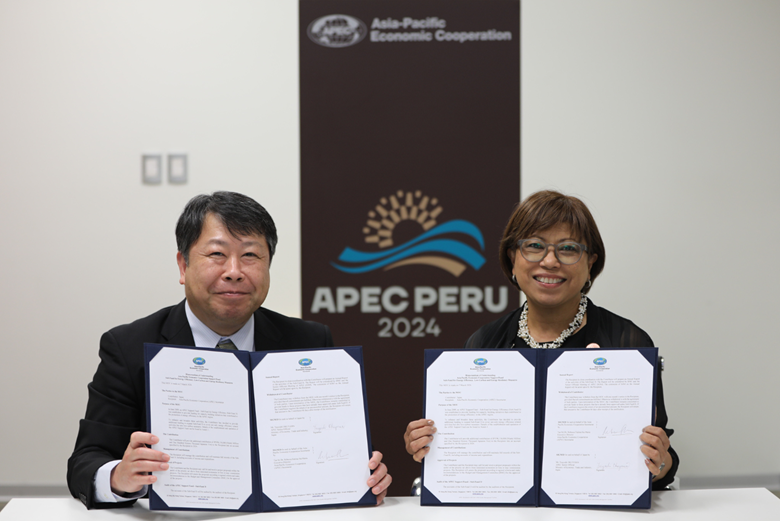Japan Contributes JPY 90 million to Boost Energy Efficiency and Low-Carbon Initiatives

Japan has donated JPY 90.1 million in funding to advance the promotion of energy efficiency and low-carbon related activities in the APEC region by supporting activities under the purview of the APEC Energy Working Group.
The contribution was confirmed in a Memorandum of Understanding signed by Tsuyoshi Okuyama, Japan’s Senior Official for APEC and Dr Rebecca Sta Maria, Executive Director of the APEC Secretariat earlier this month, on the sidelines of the First APEC Senior Officials’ Meeting held in Lima, Peru.
“APEC member economies are facing an increasing and urgent climate change that threatens our economies and people’s livelihoods,” said Okuyama. “It is crucial for us now to strengthen our work in reducing greenhouse gas emissions and promoting energy transitions through various and practical pathways.”
“Our contribution to the Energy Efficiency, Low Carbon and Energy Resiliency Measures Sub-Fund will support APEC’s work in promoting sustainable growth across sectors as well as ensuring energy security and access,” Okuyama added.
The Energy Efficiency, Low Carbon and Energy Resiliency Measures Sub-fund was established in 2009 with Japan's initial contribution of JPY120 million and an additional JPY360 million in 2010. It is one of thirteen thematic sub-funds managed by the APEC Secretariat.
The sub-fund seeks to improve cooperation in relevant APEC fora to develop, encourage and exchange best practice policies as well as promote capacity-building programmes that bolster energy efficiency and low-carbon measures in the region.
APEC is on track to meet its current goals to reduce energy intensity to 45 percent from 2005 levels by 2035, and to double renewable energy from 2010 levels by 2030, according to the latest edition of the APEC Energy Demand and Supply Outlook.
The region accounts for 56 percent of world energy demand, 58 percent of world energy supply and 68 percent of world electricity generation. APEC accounts for 60 percent of global CO2 emissions.
“Climate change is a global threat but its effects are especially felt in the Asia-Pacific region where thousands of vulnerable communities are exposed to extreme weather events,” said Dr Sta Maria.
“Adding to that, APEC economies pump out greenhouse gas emissions at disproportionately higher rates than our share of global economic output or population which means that we get the lion’s share of the responsibility, and of the consequences of inaction.”
“Support for capacity building initiatives focused on reducing the greenhouse gas emissions and increasing energy efficiency will strengthen our collective efforts in addressing the climate crisis,” Dr Sta Maria concluded.
Projects are a vital part of the APEC process. They help translate the policy directions of APEC economic leaders and ministers into actions, which contribute to creating tangible benefits for people living in the Asia-Pacific region. APEC provides funding for over 100 projects each year, with around USD22.6 million available in 2024.
For further details, please contact:
Masyitha Baziad +65 9751 2146 at [email protected]
Michael Chapnick +65 9647 4847 at [email protected]

